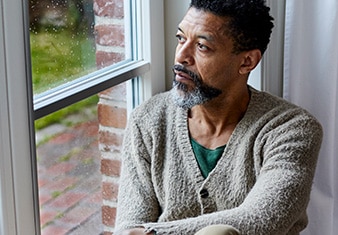A doctor, nurse practitioner, or physician assistant who serves as your main point of contact to oversee your mental and physical care needs. Also known as a primary care physician.
Cancer treatment
Common cancer treatments
Your cancer is unique to you, so your care should be too. With a wide range of treatment options, your care team can fight your cancer as aggressively as needed. But they’ll also do it with as little impact on the rest of your body as possible. Because our goal isn’t just a quick recovery — it’s helping you live the life you want.
Learn more about the most common treatment options.
Tries to remove all or part of a tumor and the surrounding tissue. If the cancer hasn’t spread, surgery is one of the most effective treatments available.
Damages or destroys the cancer cells in solid tumors using high-energy particles or waves, like X-rays. This treatment targets a precise location to avoid harming healthy tissue.
Uses drugs to destroy cancer cells and keep them from growing or spreading.
Targets molecules from specific genes to slow the growth and spread of cancer cells without affecting normal cells.
Supports the body’s immune system with drugs or cell therapy so it can find and destroy cancer cells.
Replaces damaged stem cells with healthy ones. Healthy stem cells help your body make red and white blood cells, platelets, and more.

Cancers we treat
As a Kaiser Permanente member, you have access to a wide spectrum of cancer therapy options. That includes advanced procedures designed for your type and stage of cancer.
Common cancer types
At Kaiser Permanente, a dedicated care team will coordinate your care every step of the way. Our cancer experts and other specialists are part of the same organization. So you can rest easy knowing they always have your latest medical history and treatment plan..
Get to know the health care professionals you may see along your cancer journey.
A health professional trained to discuss emotional and physical support services with you and your family.
A doctor who specializes in drug-based cancer treatments, like chemotherapy, targeted therapy, and immunotherapy.
A health professional trained to use diet and nutrition to keep your body healthy and strong.
A partner who works with your personal doctor’s office to help guide you through diagnosis, treatment, and recovery.
A health professional trained to help you understand your cancer risk and the best care options.
A surgeon who specializes in removing tumors and surrounding tissue.
A health specialist who prepares medications and explains their side effects.
A nurse who specializes in caring for people with cancer.
A doctor who specializes in image-guided procedures to diagnose and treat cancer.
A doctor who specializes in radiation treatments for cancer.
Heidi's story
On the road to survival after cancer diagnosis and treatment
Discover how Heidi Hayes went from diagnosis to survivorship with the help of team-based cancer care.
Latest cancer articles

Get the mental and emotional support you need
Going through cancer treatment can be both physically and emotionally difficult. You may feel anxious or depressed or have trouble sleeping or eating. It’s important to find the care you need. Before, during, and after treatment, you and your family can:
- Talk about how you’re feeling, what’s working, and whether you feel supported and understood
- Attend individual or group sessions with a mental health counselor
- Access self-care apps and more 24/7 tools to support your emotional wellness
Find health classes and support groups near you
Connection can be crucial during this tough time. With support groups and wellness classes, you can:
- Exchange information, experiences, and encouragement with people in similar situations
- Interact in a safe, confidential, and supportive environment
- Learn helpful coping techniques and health tips from a team of professionals
- Attend wellness classes in person, by phone, or online*

Footnote
*Classes vary by location. Some members may have to pay a fee for certain classes.
Connecting to care
Call us 24/7 and talk with a licensed care clinician about your questions or concerns. Find your local phone number below.






